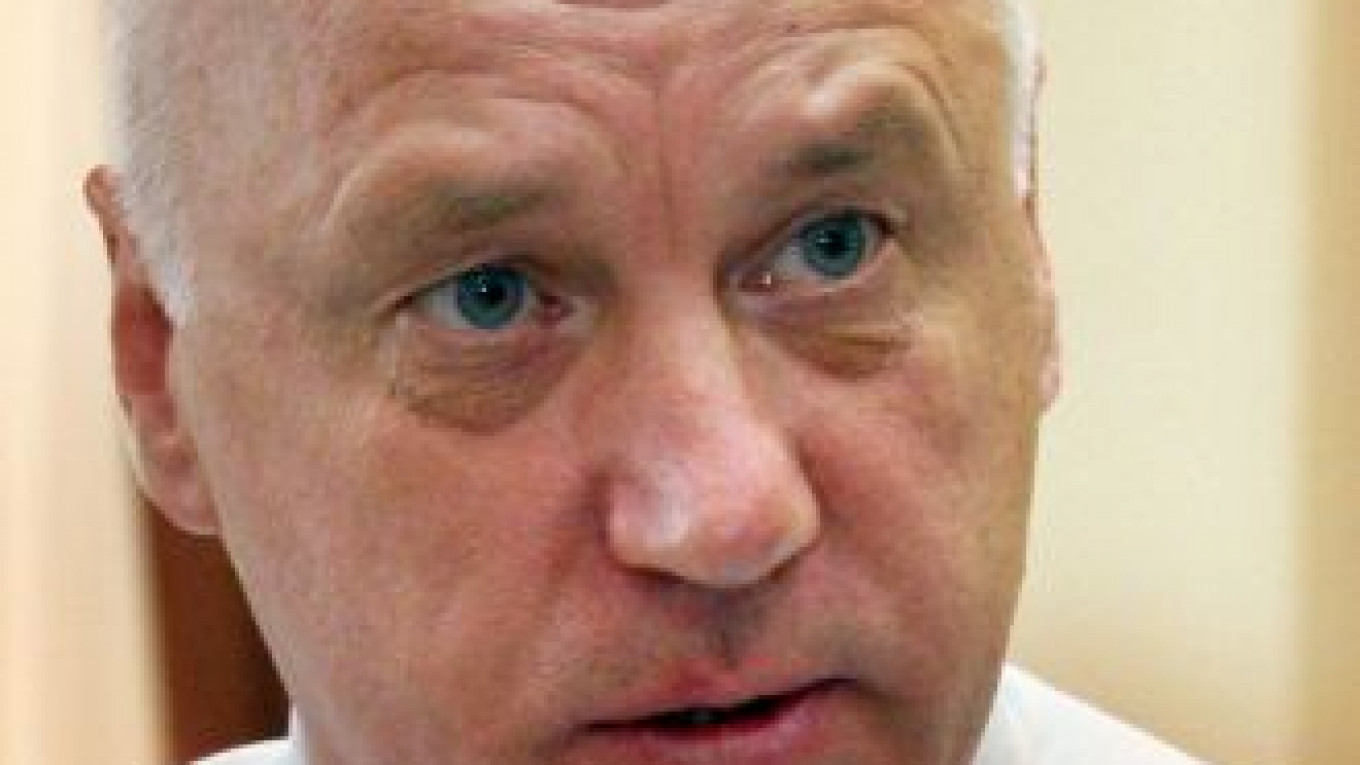Russia's top investigator, Alexander Bastrykin, has offered a senior post to State Duma Deputy Alexander Khinshtein, a critic who has accused him of corruption.
Bastrykin, head of the Investigative Committee, has sent Khinshtein an offer to work as his top investigator in the North Caucasus Federal District, a position that holds the rank of his deputy, committee spokesman Vladimir Markin said Tuesday.
"If Khinshtein is willing to make a real contribution in fighting crime, the head of the Investigative Committee is waiting for him to make decisive steps in this direction," Markin said, Interfax reported.
Khinshtein told reporters that he would consider accepting the Investigative Committee appointment under two conditions: that President Dmitry Medvedev both gave his approval and offered him a direct line of communication with the country's leaders.
Khinshtein said he needed the direct line "bypassing the head of the Investigative Committee to inform them about the real situation in the most complex region of Russia, as well as in the Investigative Committee itself," Interfax reported.
"It's wrong to make such decisions without [Medvedev's] knowledge," he added.
A Kremlin source told Itar-Tass that Bastrykin had no right to make the job offer to Khinshtein because it was Medvedev's responsibility to appoint the Investigative Committee's head and his deputies.
Khinshtein also said the job offer convinced him that the level of corruption and lack of qualified staff in the Investigative Committee was "more grave than ever before."
Repeated calls to Khinshtein's cell phone went unanswered Tuesday.
On Monday, Bastrykin offered Khinshtein the top job at the Investigative Committee's internal security department, but the lawmaker rejected the offer as a demotion, a Duma source told Interfax.
Bastrykin was "saddened" by Khinshtein's refusal and believed that the new offer was for a position equal to the lawmaker's current status, Markin said.
Vladimir Pribylovsky, a political analyst with the Panorama think tank, dismissed Bastrykin's job offer as a publicity stunt to attract attention to his new role under the Kremlin plans to separate the Investigative Committee from the Prosecutor General's Office and create an investigative agency with expanded powers.
A bill on the new investigative agency is scheduled to be considered in a first reading in the State Duma on Wednesday.
Pribylovsky said Bastrykin knew that Khinshtein would never accept the post and Khinshtein purposefully set conditions that he knew would never be met to create some publicity for himself.
In possible support of Pribylovsky's theory, Markin condemned Khinshtein's conditions, calling them "another proof" that the lawmaker was incapable or unwilling to take the job and was only capable of criticism.
"We didn't expect any other reaction," Markin said.
Khinshtein, who is also a muckraking reporter for Moskovsky Komsomolets, has accused Bastrykin of corruption at least twice.
In April, Khinshtein accused Bastrykin of ordering Krasnodar region investigators to open a criminal case into the local operator of an amusement park after his children were denied a ride there.
In July 2008, Khinshtein accused Bastrykin of owning a business in the Czech Republic — putting him in violation of Russian law.
Bastrykin denied both reports.
Khinshtein, who often uses records of telephone conversations that he obtains from law enforcement sources for his journalistic investigations, was detained in May 1999 for using a phony police identification card, which he produced after driving through a red light.
A Message from The Moscow Times:
Dear readers,
We are facing unprecedented challenges. Russia's Prosecutor General's Office has designated The Moscow Times as an "undesirable" organization, criminalizing our work and putting our staff at risk of prosecution. This follows our earlier unjust labeling as a "foreign agent."
These actions are direct attempts to silence independent journalism in Russia. The authorities claim our work "discredits the decisions of the Russian leadership." We see things differently: we strive to provide accurate, unbiased reporting on Russia.
We, the journalists of The Moscow Times, refuse to be silenced. But to continue our work, we need your help.
Your support, no matter how small, makes a world of difference. If you can, please support us monthly starting from just $2. It's quick to set up, and every contribution makes a significant impact.
By supporting The Moscow Times, you're defending open, independent journalism in the face of repression. Thank you for standing with us.
Remind me later.






